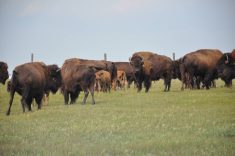The Agricultural Producers Association of Saskatchewan wants the labour dispute at XL Foods in Moose Jaw, Sask., resolved and the plant reopened.
The organization issued a news release last week after learning that some animals had been slaughtered at the plant so the company can retain its federal inspection status.
Canadian Food Inspection Agency officials confirmed inspectors were at the plant March 25 for a one-day slaughter.
Ken Schmidt, the CFIA’s Saskatchewan region director, said he couldn’t confirm the inspection was done to retain registration. XL Foods did not respond to a request for comment.
Read Also

Canadian Food Inspection Agency extends chronic wasting disease control program consultation deadline
Date extended for consultation period of changes to CWD program
However, under the regulations of the federal Meat Inspection Act, registration lapses if a plant is inactive for 12 consecutive months, Schmidt said. There is no provision to extend a registration beyond that time.
XL Foods laid off its employees last April 24 and announced a temporary closure until the end of September. The company locked out the workers days before the facility was set to reopen, citing its inability to reach a collective agreement.
Employees have been picketing outside the plant since then.
Brian Nilsson, co-chief executive officer of XL Foods, has said the company wants to reopen the plant and that it has a place in XL’s long-term plans.
APAS president Greg Marshall said the fact XL sought to retain its registration seems to indicate its intention to reopen.
“On behalf of our province’s livestock producers, we encourage both sides of the dispute to sit down together and work out their differences,” Marshall said.
The United Food and Commercial Workers, which represents the approximately 200 workers, said no bargaining dates have been set.
The union is also bargaining on behalf of XL employees in Calgary, and talks are expected to begin on behalf of employees in Brooks, Alta., later this year.
Schmidt said officials examined XL’s food safety and hazard analysis critical control points plans during the March 25 slaughter to make sure they were in place and functioning.
“They did very well,” he said. “They passed all the requirements and they took it very seriously.”
Schmidt said if the inspection had not taken place and the company’s registration had lapsed, XL would have had to go through a rigorous reinspection process if and when it wanted to reopen the plant.















